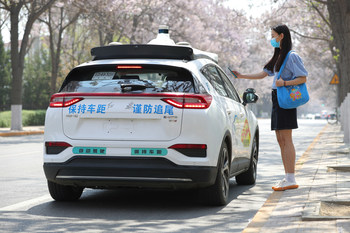Baidu plans world’s largest ride hailing in 2023
- December 5, 2022
- William Payne

Baidu has announced plans to build the world’s largest autonomous ride-hailing service area in 2023. The company has also announced a series of technical achievements in self driving technology including a big AI model for autonomous driving perception, high definition autonomous driving maps, a closed loop driving data system, and success in end-to-end adaptation of AI chips for self driving vehicles.
Currently, Baidu’s autonomous ride-hailing platform Apollo Go covers more than 10 cities in China including all first-tier cities. In Q3 2022, Apollo Go completed more than 474,000 rides, up 311% year over year, and a 65% increase compared to last quarter. In first-tier cities like Beijing and Shanghai, each robotaxi on Apollo Go can provide 15 rides a day on average, nearly the same daily ride average of typical online ride-hailing car services. By the end of Q3 2022, the accumulated rides provided to the public by Apollo Go reached 1.4 million.
To address the “long tail” problem, where a self driving vehicle runs into a scenario it has not seen or experienced before, Baidu has developed an AI big model for autonomous driving. Announced by the company’s lead autonomous driving technology developer Jingdong Wang, the new model is a pre-trained visual-language model with weak supervision, backed by the Baidu WenXin Big Model, which recognises thousands of objects, helping to enlarge the scope of semantic recognition. The model is designed to enable autonomous vehicles to quickly make sense of an unseen object, such as special vehicle (fire truck, ambulance) recognition, or plastic bag misdetection.
The company has also announced a new high definition autonomous driving map. Using AI to increase efficiency and bring down the cost, the automation rate of Baidu’s high precision map production has now reached 96%. Integration of vehicle-side perception data and multi-source maps to generate online maps in real time the company says has helped to significantly ensure the safety of autonomous driving.
The new map system utilises massive data together with human driver knowledge to improve driving reliability. The map includes more than 12 million kilometres of road networks and data accumulated on Baidu Maps, along with hundreds of millions of human drive-hours.
Baidu has also introduced Apollo Loop, a closed-loop data system to effectively identify and utilise data to manage the exponential growth in data to be managed as autonomous vehicles are deployed at larger scale. To cleanse data, the system leverages both on-board small AI models and cloud-based big AI model to achieve high-efficiency data mining and automated labeling. The data ingestion architecture achieves automated training with its group-optimisation ability and data distribution understanding to effectively utilise data and further enhance the overall intelligence of autonomous driving.





